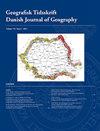地球工程科学家如何看待他们在气候安全政治中的角色——从担忧和不安到战略定位
IF 1.1
4区 社会学
Q4 ENVIRONMENTAL STUDIES
Geografisk Tidsskrift-Danish Journal of Geography
Pub Date : 2019-01-02
DOI:10.1080/00167223.2019.1573352
引用次数: 2
摘要
净负排放对于实现2015年世界各国领导人在巴黎达成的2度最大变暖目标至关重要,该目标旨在缓解气候变化的影响,这些影响通常被视为对全球和地区人类安全的威胁。地球工程提供了对气候变化的即时反应,通过故意改变气候系统使地球降温,可以立即抵消这些“危险”的影响。这可以说将地球工程专家置于未来气候变化和安全政策的中心。基于对著名地球工程科学家的采访的经验数据,本文探讨了这些地球工程专家在寻求从安全政治中获得科学专业知识和自主权时如何标记和划分他们的工作,同时争论他们的研究与气候变化的相关性。这项研究表明,地球工程专家如何看待他们的研究的科学潜力,以及他们对这项研究的安全应用的不安,两者之间存在着模糊。“地球工程”和“地缘政治”之间的明显区别是用不同的修辞风格绘制和维护的,但当个人战略和安全政治出现时,这种区别就消失了。在此背景下,本文讨论了(安全)政治和(地球工程)专业知识之间的想象边界,并建议在社会中建立更透明和反思的科学。本文章由计算机程序翻译,如有差异,请以英文原文为准。
How geoengineering scientists perceive their role in climate security politics – from concern and unease to strategic positioning
ABSTRACT Net negative emissions are essential for realizing the two-degree maximum warming target agreed by the world leaders in Paris 2015 for mitigating predicted climate change impacts, which are often framed as threats to human security, globally and locally. Geoengineering offers an immediate response to climate change which might instantly offset these “dangerous” impacts by deliberately altering the climate system to cool the planet. This arguably places geoengineering experts at the centre of future climate change and security policies. Based on empirical data from interviews with renowned geoengineering scientists, this article explores how these geoengineering specialists label and delimit their work when seeking to claim scientific expertise and autonomy from security politics, while arguing for the relevance of their research on climate change. The study shows an ambiguity between how the geoengineering specialists see the scientific potential of their research, and their unease towards the security applications of this very research. A clear distinction between “geoengineering” and “geopolitics” is drawn and upheld using different rhetorical styles, but dissolves when personal strategies and security politics emerge. On this background, the article discusses the imaginary boundary between (security) politics and (geoengineering) expertise, and suggests more transparent and reflexive science in society.
求助全文
通过发布文献求助,成功后即可免费获取论文全文。
去求助
来源期刊
CiteScore
5.20
自引率
0.00%
发文量
5
期刊介绍:
DJG is an interdisciplinary, international journal that publishes peer reviewed research articles on all aspects of geography. Coverage includes such topics as human geography, physical geography, human-environment interactions, Earth Observation, and Geographical Information Science. DJG also welcomes articles which address geographical perspectives of e.g. environmental studies, development studies, planning, landscape ecology and sustainability science. In addition to full-length papers, DJG publishes research notes. The journal has two annual issues. Authors from all parts of the world working within geography or related fields are invited to publish their research in the journal.

 求助内容:
求助内容: 应助结果提醒方式:
应助结果提醒方式:


